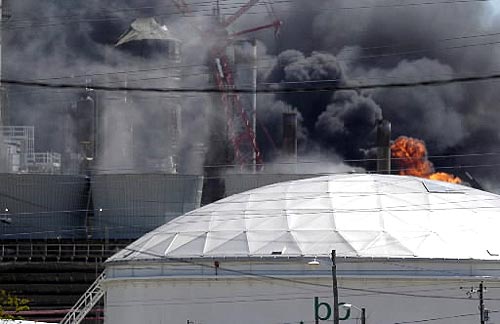 |
The explosion apparently began in the isomer unit, which produces components used to raise the octane content of gasoline. The facility,which first began operations in 1934, is huge, employing over 1800 workers. Plant workers are represented by the Paper, Allied-Industrial, Chemical and Energy Workers International Union (PACE)but plant management reports that all 14 who died were contractors working for J.E. Merritt in Pasadena, Calif., part of Jacobs Engineers.
The rising use of contractors in oil refineries as a way to cut costs has been highly controversial. OSHA commissioned an investigation into the massive October 1989 explosion at a Texas Phillips 66 refinery that killed 23 workers. That explosion also involved contractors, and the resulting "John Gray" report found that they had not received adequate training and were not adequately familiar with how the plant operated. At the time of yesterday's explosion, the plant was undergoing a "turnaround" process, or annual major maintenance, and it was gradually being brought back on line. 2200 out of the 3300 workers at the facility yesterday were contract employees.
According to the Associated Press,
The blast left a gaping hole in the earth, mangled nearby offices, and was so powerful that witnesses said it rattled homes as far as five miles away. Cars and trucks in an employee parking lot were coated with soot and debris.Production at the plant is so large that the explosion caused fuel prices to rise.
"It was real scary. Have you ever heard the thunder real loud? It was like 10 times that," said plant worker Charles Gregory, who was with several co-workers inside a trailer tank when the floor started rumbling.
The Texas City plant has a long history of safety problems. A Sept. 2, 2004, accident killed two Texas City workers when pressurized, superheated water was released from a 12-inch check valve. The incident resulted in a $109,500 OSHA fine, including seven serious violations and a willful citation for failing to relieve trapped pressure within a pipe.BP's Texas City complex includes 30 refinery units spread over 1,200 acres.
With 460,000 barrels of crude oil processed every day, the plant provides 3 percent of the U.S. gasoline supply. The refinery also ranks as the eighth largest polluter in the state of Texas. It released 5.1 million pounds of pollutants in 2002, according to the latest data, including some chemicals that are known carcinogens and cause other serious health effects.
A population of 31, 413 people resides within a three-mile radius of the refinery.
The refinery was fined $63,000 for a March 30, 2004 explosion and fire in which no one was injured. There was also a fire in 2000 in which no one was injured and and explosion in 1995 that sent over 100 to the hospital. Finally, in 1993, the company paid $20 million in damages to the family of a worker who died after an April 1992 explosion at the Texas City plant.
Texas City was also the site of one of the biggest industrial disasters in American history when 576 people were killed when a fire aboard a ship at the Texas City docks triggered a massive ammonium nitrate explosion. That blast broke windows in Houston, forty miles away.
The US Chemical Safety and Hazard Investigation Board is on its way to Texas to investigate the blast.
Recent Workplace Disasters
Although the final death toll is not in yet, this appears to be the worst workplace disasters in recent history
- April 23, 1987: 28 construction workers died in the collapse of the L'Ambiance Plaza apartment building
- October 23, 1989: A fire and explosion in Pasadena, Texas, Phillips 66 refinery killed 23 workers
- July 5, 1990: Explosion at Arco Chemical Co. chemical plant in Channelview kills 17 people.
- September 3, 1991: 25 workers died another 49 were injured fighting to escape through locked fire doors of the Imperial chicken processing plant in Hamlet, NC
- Sept. 23, 2001: 13 workers were killed in an explosion at the Jim Walter No. 5 underground mine in Brookwood, Alabama.
Living with refineries: here and here.
UPDATE
BP Refinery Blast Sends Gasoline Futures to a Record
March 24 (Bloomberg) -- An explosion at a BP Plc refinery in Texas sent gasoline to a record $1.608 a gallon in New York and heightened concern supplies may be disrupted before the U.S. summer driving season.
BP, the world's second-largest publicly traded oil company, said yesterday the explosion in Texas City, Texas, killed at least 14 people and injured 70 at its biggest refinery. A gasoline component-making unit is shut, Hugh Depland, a BP spokesman said yesterday by telephone from Houston.
The fire was at least the fourth incident in a year at the plant, which processes 460,000 barrels a day of crude oil and supplies about 30 percent of BP's fuel in North America. Gasoline has gained 47 percent this year, increasing inflationary pressure in the world's largest economy and leaving consumers with less to spend.
The Texas City plant is "a monster of a refinery," said Ed Silliere, vice president of risk management at Energy Merchant LLC in New York. Now is "the wrong time for us to be seeing the loss of this unit as we get set to go into the gasoline season."
More BP stories here.